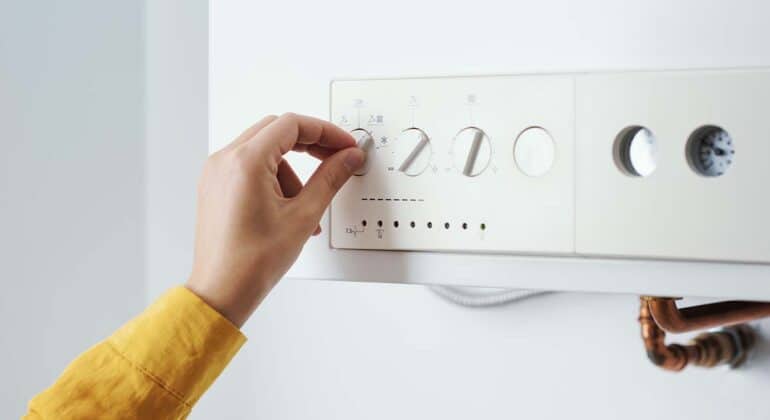If it’s time to swap out your boiler, be sure to explore all your choices. You have several options to consider, but the key difference lies in whether the unit is condensing or non-condensing. While both burn fuel, a condensing boiler is significantly more efficient and can lead to substantial savings for your household. It’s no surprise that in the UK, installing condensing boilers is now mandated by law.
How does a condensing boiler work?
The purpose of such a boiler is to recycle heat from the waste flue to preheat the water that enters the boiler. This is achieved by a second heat exchanger, or by a more optimal flow and return temperatures from the main heat exchanger. This process reduces energy waste and enables more heat generation for less money. In the recovery process, water vapour found in the gasses turns into liquid and results in condensation. That is where the boilers take their name from.
Advantages of a condensing boiler
Apart from efficiency, there are also other major advantages to modern condensing boilers.
- The green solution – if you are all about reducing your carbon footprint, replacing the old boiler with a higher efficiency one is a good place to start. A more efficient way to heat the water can make a difference. A new condensing boiler has a significantly lower carbon footprint than those old non-condensing units of the past. It is estimated that condensing boilers emit more than 1.200kg of carbon each year. And due to the government’s green deal, some households are even eligible for installation costs.
- Lower fuel costs – a more efficient boiler means reduced fuel costs, which can be essential. Believe it or not, a more efficient boiler system is key to reducing your fuel cost. That is because these boilers utilise heat that is otherwise wasted. For example, according to the Energy Saving Trust, a bungalow can save up to £170 per year with a new boiler installed. That amount is even greater for a detached property, sitting at around £580.
- Require less space – another major difference between condensing and non-condensing boilers is that condensing units take up less space than their older counterparts. For instance, a combi boiler does the job without needing a big water tank. This means you can be more flexible with your living space and even get some more usable cupboard space upon upgrade. A condensing boiler can fit in a loft space, a utility room cupboard or practically anywhere.
- Safety – if safety is important to you, and it should be, then keeping your heating system up-to-date is paramount. An old and inefficient non-condensing boiler poses some safety risks, especially if the unit is old and in need of an upgrade. Condensing boilers are a much safer option. For starters, they are 100% sealed, making them superior in regard to heat insulation. There is no risk of any debris and dirt entering the unit too. A condensing boiler cannot come into contact with potentially hazardous substances. There is a pipe that takes the waste liquid directly outside the home and into the drain.
Potential drawbacks of a condensing boiler
Getting a condensing boiler is an absolute must because the benefits far outweigh the drawbacks. However, there are some things associated with condensing boilers that you just have to account for, in order to make the most of them.
- Higher complexity – condensing boilers contain more complex systems than non-condensing models. The systems that power them are more complicated, which is also the reason why they are more efficient. However, this complexity comes at the cost of installation requirements and more knowledge on how to operate the boiler efficiently.
- External pipes can freeze – during very cold weather, some condensing boilers can have a problem due to their external pipes freezing. You need to consider this as cold weather draws in and monitor the situation in case it needs to be rectified.
- Cost considerations – the cost to install a condensing boiler is something you have to account for. Additionally, bear in mind that boiler service and maintenance costs are also a thing. The reason lies in the complexity of the design, which is also reflected by the price of replacement parts. If you have to repair your boiler, it will not be a small amount. To that end, it is best to think about condensing boiler as an investment that pays off over time with lower fuel bills.
Types of condensing boilers available
There are different models of condensing systems available that you can choose from.
- Combi boilers – this compact system combines hot water and heating into a single system for the house. It doesn’t use any water storage tanks, as it heats up instantly in the main unit.
- System boiler – the water in this system is taken straight from the main water supply of the house. It is then stored in the tank until it is needed. It can generate heat by using electricity or gas. The central heating system can use for radiators.
You can read our guide on How to turn off water supply to boiler for more information.
What type of fuels do condensing boilers use?
- Gas – the most commonly used fuel in all UK households. Gas is convenient and suits most types of homes.
- Oil – less common and mostly used in homes that have no connection to a gas main. It requires an oil tank that is fitted near the home. It has to be refilled when empty.
- LPG – another alternative for homes not connected to a gas main. Liquid petroleum gas is a type of gas that easily turns into liquid under low pressure. That means it is easily transportable in liquid form.
- Electricity – boilers that run on electricity are cheaper and easier to install. They may also require less maintenance and repairs over time.
What are the main differences between a condensing and a non-condensing boiler?
To summarise the main differences between the two types of boilers:
- The efficiency levels of condensing boilers sit at around 95%, whereas for non-condensing boilers it is about 75%.
- Condensing boilers have a greener carbon footprint, with less CO2 emissions released.
- The heat exchangers of a condensing boiler are larger.
- Condensing boilers usually feature 2 heat exchangers, while a non-condensing one only has one.
- Condensing boilers are known to recycle gases into heat better.
- There is less risk associated with condensing boilers.
- Condensing boilers are well isolated, meaning there is a very slim chance that anything will get into their system.
How to choose a condensing boiler?
When you switch to a new boiler system, there are a few factors you have to consider, such as the boiler type, the size of the house, the cost of installation and maintenance, as well as what fuel type the system will use. To make this a simple choice, you can turn to Gas Boiler and Heating Repair for some expert recommendations. We can provide you with more details on what is available and what is best for your current situation.
Condensing boilers are always the best option to go for, even though they can be more expensive to install and maintain. The greater energy efficiency and utility they provide will quickly make up for any of their shortcomings, however. It is also important to remember to look into financing options as there are some available that can ease the upfront cost of installing one such boiler in your home.
If you’re interested in learning more about boiler problems and how to solve them, we have two great articles on Worcester Boilers Problems and Most Common Vaillant Boiler Problems. Check them out for more information and tips on how to keep your boiler running smoothly!



